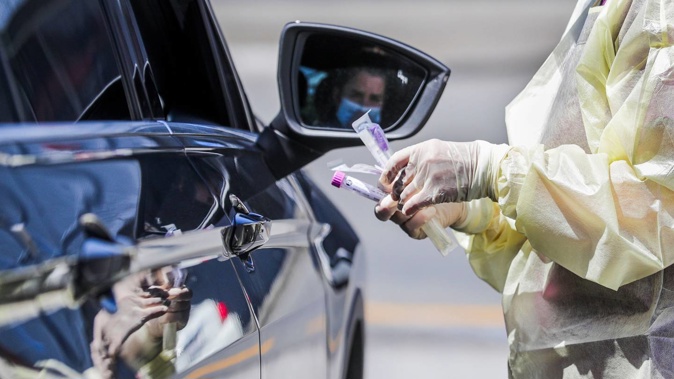
It's taken just three months for New Zealand's cumulative Covid-19 case count to leap from less than 20,000 to a million – a grim milestone experts say reflects the enormous scale of problems ahead of us.
The Ministry of Health today reported that New Zealand has reached a threshold Australia did in January, with 1,001,898 officially-logged Covid-19 cases since the start of the pandemic.
Covid-19 modeller Michael Plank said it would have been shocking to hear that figure a year ago, when Kiwis were enjoying a largely virus-free life under elimination.
"I didn't foresee something as dramatic as that."
The game-changer, of course, was the hyper-spreading Omicron: at the start of 2022, the ministry had reported only 14,255 cases: the bulk of them Delta infections.
"These numbers reflect the fact that Omicron is not only more transmissible, but it can infect people who've been vaccinated, and even boosted," Plank said.
Although the majority of infections were made up of people who'd been vaccinated, the vaccine had still largely done its job, he said, by keeping the number of hospitalisations – less than 9000 as at this week – relatively low.
Plank also pointed out that one-million figure didn't represent the true picture of infection, which could be three times that.
"But I'd doubt the true number of infections is much more than that, because that would require a lot of people in younger age groups to have been reinfected," he said.
"Although that's likely going to happen going forward, I suspect that it hasn't happened in huge numbers, yet."
Modellers have estimated that, when this Omicron wave falls to a new baseline, it might have infected half of the population.
And a second surge could hit New Zealand as early as late winter or spring.
While that it prove less severe than our first, its shape and timing hinged on some big uncertainties, such as how fast our natural immunity will wane, what new variants might arise – and whether our own behaviour will boost spread.
How much higher could our overall tally ultimately climb?
"To be honest, I think it's eventually going to reach pretty close to 100 per cent over the years, in the sense that almost everyone is likely to catch Covid at some point," Plank said.
"For most people, it might be multiple times during their lifetime, in the same way most people catch the flu several times."
At the same time, Plank and other experts have stressed Covid-19 isn't just the flu.
"The estimates we're seeing of the number of people suffering from Long Covid are quite worrying – and it's likely we'll see significant effects of that here in New Zealand, as with every other country in the world."
Studies indicate that about 10 per cent of people infected with the virus will experience long-haul symptoms – the many of which include cough, breathing difficulty, fatigue, muscle pain, heart palpatation, brain fog and mood changes.
At last month, nearly three per cent of the UK's entire population reported Long Covid symptoms – with three quarters suffering them at least 12 weeks after infection, and nearly half at least one year on.
The three most common symptoms were fatigue (51 per cent), loss of sense of smell (26 per cent) and difficulty concentrating (23 per cent) - and such post-infection problems were enough to affect day-to-day activities for around two thirds of those sufferers.
University of Auckland senior lecturer Dr Anna Brooks, who is leading a crowd-funded Long Covid research project here, said Omicron's toll had big implications for our population.
"Even if you take minimum of 10 per cent that are going to be battling with post-Omicron Long Covid, that's still a giant number."
Brooks remained concerned that New Zealand still hadn't set up dedicated services for Long Covid sufferers.
"There's still going to be that big percent of people who might struggle for months and come right, but what happens to them in the months where they can't go to work, or can't get support?"
While researchers were still learning about what remained a constellation of symptoms, there were still no specific treatments for long-haulers – something Brooks said she still found hard to swallow.
"I imagine that healthcare is just going to be a giant struggle – even getting access to see a doctor," she said.
"You know, everyone likes to pretend that we're over it and we're moving on, but it's far from it: we're going to be facing waning immunity, either from people who've had Omicron, or from vaccines, or both – and therefore our winter is looking precarious."
She urged people to avoid infection or re-infection with the virus – and if they did catch it, to ensure they rested rather than try to battle on.
Otago University epidemiologist Professor Michael Baker agreed Long Covid posed one of the most troubling questions about Kiwis' widespread exposure to the virus.
"It's an area in which there are still more questions than answers... but there's certainly enough evidence that we should be very concerned."
Baker added the common perception that Omicron was mild was "patently wrong".
"We had about 50 deaths up to the end of last year. We've now had 800-plus deaths, just in the space of a few months," he said.
"So, even though vaccination has made events like death or severe illness relatively uncommon, because of the large numbers, they can still add up quite quickly. We've seen that with this long tail of deaths with this infection."
Given the spreading power of Omicron, Baker thought it inevitable that New Zealand was forced to abandon its zero-Covid stance and instead try to tackle the virus with mitigation.
But there was much more the Government could do: and last month he and 150 other experts backed a call to beef up health measures – including re-instating a mask mandate in classrooms this winter.
Take your Radio, Podcasts and Music with you









